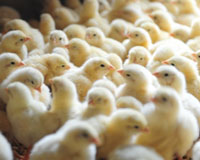Bird flu affects Bangladesh DOC production

The avian influenza outbreaks in Bangladesh at the end of 2011 have taken thier toll on the domestic agriculture sector. As well as poultry farms, the disease ravaged a number of breeding farms and thus production of day-old chicks (DOC) of both broilers and layers slumped this year.
Average production of broiler DOC, which is used for meat production, fell to 5,000,000 a week in 2012 from nearly 9,000,000 per week last year. Production of layer DOC for egg production also nosedived, said Shamsul Arefin Khaled, director of Nourish Feeds Ltd.
“The demand for feeds depends on both supply and demand for the one-day-old chicks. The higher the production of chicks, the higher the demand for feed,” said Khaled of Nourish which is also engaged in poultry breeding.
The reduced demand for poultry feed in the wake of recent bird flu outbreaks is taking its toll on Bangladeshi feed producers. According to Ihtesham Shahjahan, general secretary of Feed Industries Association Bangladesh (FIAB), feed sales during January-March 2012 dropped by 30% to 400,000 tonnes from the same period a year ago. “These are conservative figures, so it could be more,” said Shahjahan, also managing director of Quality Feeds Ltd, a leading seller of feed.
This is the second time since 2008 that the feed industry, which caters to poultry and fish farming, has been hit due to bird flu outbreaks in the poultry industry.
Currently, around 70 feed companies, including some foreign ones, are operating in Bangladesh to meet the demand for feed at 2,700,000 to 3,000,000 tonnes a year, according to an estimate of the FIAB. According to Shahjahan, it will take a year to recover from the damage and that the demand for feed might drop by 20% to 2,200,000- 2,400,000 tonnes at the end of 2012 because of bird flu.













